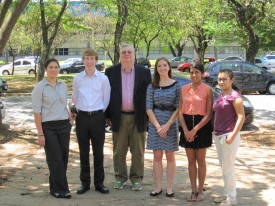
Left to Right: Devan Murphy, Paul Ludford III, Gerben Zylstra, Helen Uczkowski, Ruchi Patel, and Laura Motta
Five students from Rutgers traveled to Brazil to participate in the 20th annual Simpósio Internacional de Iniciação Científica presented by the University of Sao Paulo (USP). The Rutgers students joined over 3,600 USP students in presenting posters on their research at this four-day undergraduate scientific research symposium held from October 22–25.
Students had the opportunity to present original research posters from their respective majors. Laura Motta, a chemistry major in the School of Arts and Sciences (SAS), presented “Mercury Stable Isotope Fractionation During Photochemical and Biotic Reduction of Hg (II),” in the Science and Engineering session. The other four students presented in the Biological and Health Sciences session of the symposium. Paul Ludford III, a chemical and biochemical engineering major in the School of Engineering, presented “Computational Studies of Domain Formation in Two-Component Lipid Vesicles;” Devan Murphy, an animal science major at the School of Environmental and Biological Sciences (SEBS), presented “Role of Osteocalcin in Mice Dorsal Root Ganglia Cultures;” Ruchi Patel, an ecology and natural resources major at SEBS, presented “Long-term Population Dynamics of a Freshwater Protozoan Community;” and Helen Uczkowski, a biological sciences major at SAS, presented “Importance of Nursing for Estrogen Receptor-α (ESR1) Expression in the Neonatal Porcine Cerebral Cortex and Hypothalamus.” Posters presented by the Rutgers students were judged by USP faculty. The visiting Rutgers students toured the laboratories of USP faculty members engaged in related research fields.
The Rutgers students were able to share and learn through the research exchange with their Brazilian counterparts as well as experience a new culture firsthand. Highlights of their international experience included touring a number of research facilities, including the wave generator facility used for research on ships and oil platforms, a virtual reality programming facility used for simulations, a sugarcane plantation facility that produces ethanol, animal research facilities, as well as the Instituto Butantan vaccine research and production facility. The Instituto Butantan, founded in 1901, is well known for the production of many common vaccines, especially the production of snake bite anti-venom.
Gerben Zylstra, professor in the Department of Biochemistry and Microbiology at the School of Environmental and Biological Sciences, served as faculty escort for the five students. The University of Sao Paulo and Rutgers University have had a long-standing research exchange.

